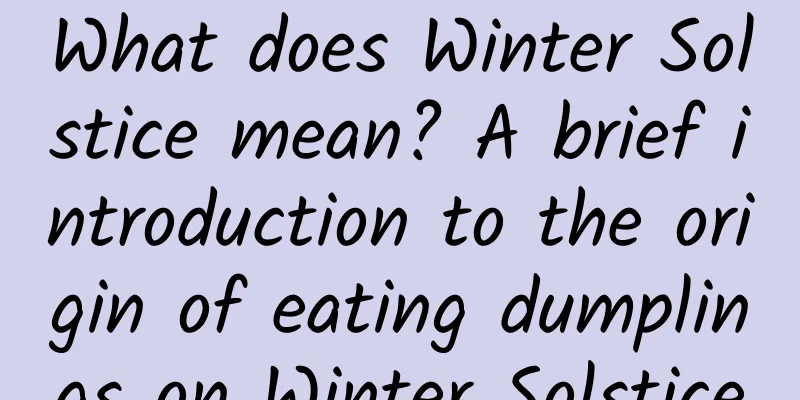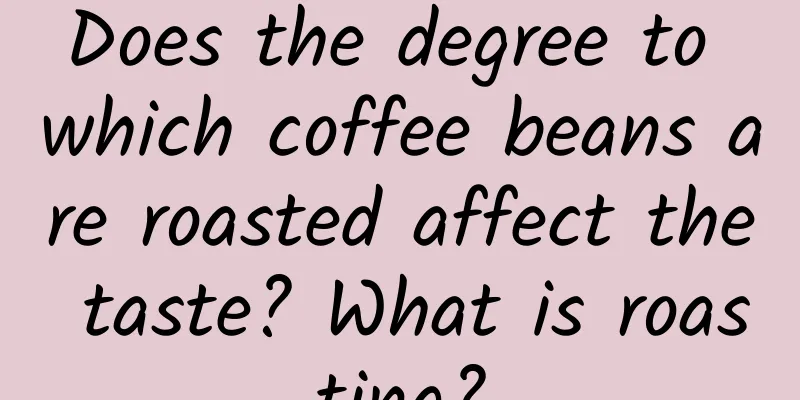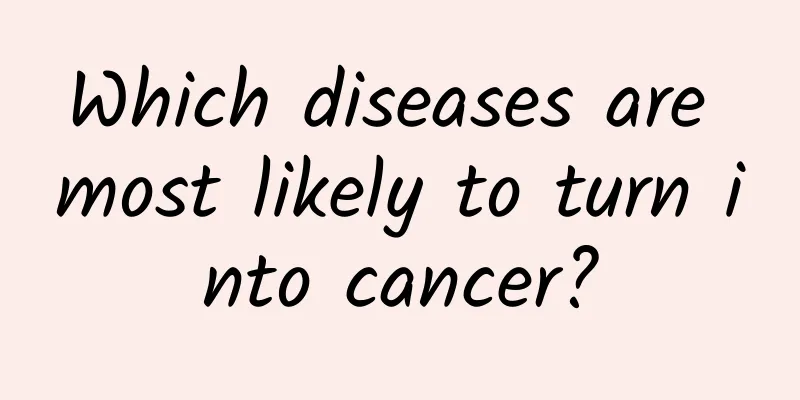What does Winter Solstice mean? A brief introduction to the origin of eating dumplings on Winter Solstice

|
Winter Solstice is a traditional Chinese festival and one of the 24 solar terms. Winter Solstice is usually on December 21 or 22 of the Gregorian calendar. This day is the day with the shortest day and the longest night, so it is also called "the shortest day of the year". In ancient times, people attached great importance to Winter Solstice. There was a saying that "Winter Solstice is as important as New Year". We all know that we should eat dumplings or glutinous rice balls on Winter Solstice, but do you know its origin? Contents of this article 1. What does the winter solstice mean? 2. A brief introduction to the origin of eating dumplings during the winter solstice 3. Rhymes about the Winter Solstice 1What does winter solstice mean?Winter Solstice is a festival and one of the solar terms. Winter Solstice usually falls on December 21 or 22 of the Gregorian calendar, and the day of the winter solstice is the shortest day of the year. During the winter solstice, people eat nourishing and cold-dispelling foods, such as glutinous rice balls in the south and dumplings in the north. In addition, there are ancestor worship activities. The Winter Solstice is a traditional Chinese festival and one of the 24 solar terms. The Winter Solstice is usually on December 21 or 22 of the Gregorian calendar. This day is the shortest day and the longest night, so it is also called the "shortest day". In ancient times, people attached great importance to the Winter Solstice. There was a saying that "the Winter Solstice is as important as the New Year", so the Winter Solstice was also called "New Year's Lucky Draw" and "Little New Year". The winter solstice is marked by the lowest altitude of the sun in the northern hemisphere. At this time, the sun shines directly on the Tropic of Capricorn, so the daytime is very short, but the temperature is not necessarily the lowest. The ancients believed that the yang energy was the lowest on the winter solstice, so they would eat some nourishing and cold-dispelling foods on the winter solstice. After the winter solstice, the temperature would slowly return. There are many customs during the winter solstice. For example, people in the north eat dumplings to prevent their ears from getting frostbitten in the coming winter, while people in the south eat glutinous rice balls, which means "reunion". The winter solstice has both natural and humanistic connotations, so in addition to farming activities, there are also traditional worship activities. 2A brief introduction to the origin of eating dumplings during the winter solsticeThe origin of eating dumplings on the winter solstice is about Zhang Zhongjing. According to legend, Zhang Zhongjing saw the poor people's hands and feet festering in winter, so he decided to use medicinal materials and dough to make some medicinal soup to help the poor people get rid of the cold, and named it "Quhan Jiao'er Soup". The day he helped the people happened to be the winter solstice, so eating dumplings on the winter solstice gradually became popular. The origin of eating dumplings on the winter solstice is said to be the story of Zhang Zhongjing, a great doctor in the Eastern Han Dynasty. When he returned to his hometown to visit his relatives, he saw many poor people on the river bank. Those people were naked, their hands and feet were festering in the severe cold weather, and even their ears were frozen. Zhang Zhongjing was very sad to see this scene, so he wanted to do something to help treat these people. He put chili peppers and some cold-repelling herbs together, and then wrapped them in dough, making them look like ears. On the day of the winter solstice, Zhang Zhongjing used "Jiao'er" to give medicine soup to the poor, and named it "Quhan Jiao'er Soup". After drinking Jiao'er soup, people felt hot all over, and their ears gradually became warm. Since then, the custom of making "Quhan Jiao'er Soup" on the winter solstice has been passed down. However, at that time, people ate dumplings mainly to drive away the cold. Even now, it still has a certain meaning of food supplement, but it is mainly to commemorate the winter solstice and Zhang Zhongjing. The ancients attached great importance to the winter solstice, and there was even a saying that "the winter solstice is as important as the New Year". 3Rhymes about the Winter SolsticeThere are many rhymes about the Winter Solstice, including but not limited to: 1. "Don't go out on the 19th and 29th days, walk on the ice on the 39th and 49th days." 2. "The Winter Solstice is here, the Winter Solstice is here, chaos in the south, dumplings in the north." 3. "The Winter Solstice, the day of creation, count past the 99th day, spring comes and swallows arrive." 4. "The north is busy making dumplings on the Winter Solstice, the south is busy boiling soup on the Winter Solstice." Other rhymes about the Winter Solstice include: 1. "If you don't eat dumplings during the Winter Solstice, your ears will freeze off and no one will care." 2. "It snows heavily during the Winter Solstice, so boil water to cook dumplings." 3. "It is fashionable to eat tonic food during the winter, so don't forget to burn some incense for your ancestors." The Winter Solstice is one of the 24 solar terms in ancient China. The Winter Solstice means the arrival of winter. The customs of the Winter Solstice vary from place to place in China. Generally speaking, people in the south will worship their ancestors and hold banquets, while people in the north will make dumplings and eat them. A jingle is a linguistic phenomenon and a kind of folk oral rhyme. There is no standard for the length of sentences in a jingle, and there are no strict requirements for the rhyme. Generally, it is enough as long as the jingle is easy to read. |
>>: Food safety is our shared responsibility
Recommend
What should a girl do if she feels itchy down there?
Generally speaking, when we mention gynecological...
How to prevent Corgi from shedding? What can I do if Corgi sheds a lot?
Hair loss is a very common symptom in dogs, espec...
Ovarian laparoscopic surgery
Now laparoscopic surgery has gradually developed ...
Can I wash my hair at night? When is the best time to wash my hair?
Washing hair is something that everyone does. Now...
What to do if there is a fibroid on the cervix
What should I do if I have uterine fibroids at th...
What are the symptoms of miscarriage during pregnancy?
Fetal arrest is fetal growth retardation, which m...
How often is it appropriate to have sex during ovulation?
For couples who are preparing to conceive, you wi...
What to do if breastfeeding causes nipple pain
Nowadays, many mothers choose to breastfeed their...
Is it normal for a 30-week-old fetus to weigh 3 pounds?
It is normal for women to give birth at 40 weeks ...
Can I breastfeed if I have a fever due to mastitis during lactation?
If a mother has symptoms of mastitis and fever du...
Why do I feel pain in my lower abdomen on the right side?
Many women experience some physical discomfort be...
Women with eight diseases should not get pregnant
During the pregnancy preparation period, you must...
Is severe cervical erosion easy to treat?
Severe cervical erosion has reached a very seriou...
Effects of eating mustard on the fetus during pregnancy
Some pregnant women prefer spicy food, so the tas...
What materials is the Great Wall made of? How many provinces does the Great Wall span?
The mighty and magnificent Great Wall reflects th...








![[Fat Bear Science] Do you like hot food? Do you like hot tea? Do you love spicy food? Beware that this cancer is caused by eating](/upload/images/67f1ecbae09d8.webp)
